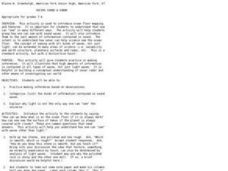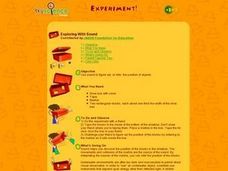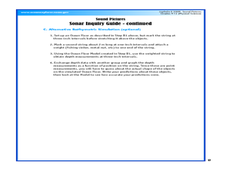Discovery Education
Sonar & Echolocation
A well-designed, comprehensive, and attractive slide show supports direct instruction on how sonar and echolocation work. Contained within the slides are links to interactive websites and instructions for using apps on a mobile device to...
Curated OER
Ping!
Using "mystery bathymetry" shoeboxes, young explorers simulate sonar action to map out the topography of an un-viewable landscape. This classic activity helps physical oceanography learners understand how sonar works. It would be...
Curated OER
The Unseen Ocean Floor
Students build ocean floor structures, then map and model an unfamiliar ocean floor. They are introduced to bathymetry and sea floor features, and discover one of the most widely usd methods for studying the ocean.
Curated OER
Finding Ocean Depth
How to oceanographers measure the sea's depth? Your scientists will step into their shoes in this application worksheet, first reading about how the speed of sound and a simple formula give scientists a depth estimation. Students...
Curated OER
Seeing Sound & Sonar
Students make inferences based on different sounds that they hear. In this inferences lesson plan, students will hear sounds of different objects and describe the sounds based on what they hear. They will answer various questions about...
Curated OER
TE Lesson: Habitat Mapping
Students examine the current technologies used in mapping resources in the marine environment. They look at remote sensing, sounding, and underwater vehicles. They examine image from the benthic habitat produced by the GIS in order to...
Curated OER
Ping!
Seventh graders study side-scan sonar and discover how it can be used to locate objects underwater. They complete a sonar simulation activity in which they create and map mystery landscapes inside shoeboxes.
Curated OER
Finding the Way
Young scholars identify and research navigational tools used in deep sea explorations. They are introduced to a compass, the Global Positioning System and sonar technology and then describe their uses in underwater exploration.
Curated OER
2005 Grade 8 Science Released Test Questions
Here is a collection of 22 multiple-choice questions on topics from the physical and life sciences. Apparently they came from an 8th grade comprehensive science exam and have been released for public use. They may serve as a sufficient...
Curated OER
See That Sound?
Students study sonar and will explain the concept of it and its major components. For this design lesson students build a low-cost sonar system.
Curated OER
Sonar Simulation
Students explore how a side-scan sonar can help locate underwater objects. In this hands- on lesson students compare side-scan sonar and other methods used to search for underwater objects by creating their own "simulation" of a...
Curated OER
Exploring With Sound
Students experiment with sound. In this sound lesson, student tape blocks inside a shoe box and then roll a marble inside. They use the sound of the marble hitting the blocks to discover where they are much like the use of sonar...
Curated OER
Sonar Mapping
Students use a shoe box to create a seafloor model and use cardboard for layering inside of the shoe box to simulate the ocean floor. They probe the ocean floor to simulate sonar echoes. Finally, students graph their data to get a...
Curated OER
Sound Pictures
Students examine the components of a sonar system. In this physical science lesson students explain how multibeam and sidescan sonar systems are useful to ocean explorers. Students simulate sonar operations in an activity using a motion...
Curated OER
The Hunt for Red October
Ninth graders identify and apply some of the vocabulary used in Science concerning the Sea Perch project. They view a video of The Hunt for Red October, and students make a comparative study of the translation of the printed work onto...
Curated OER
Ride the Wave!
Young scholars examine how sonar works. They discuss the concept of sound waves, observe a demonstration of how sonar works using water, pie plates, and eyedroppers, and describe how sonar works in their own words.
Curated OER
Space: The Final Frontier
Sixth graders construct a graph to demonstration information that they've learned about the solary system. They also write or illustrate a sonar or lunar eclipse.
Curated OER
Seeing Sound and Sonar
Young scholars grasp how underwater animals can "see" using sound waves. They practice making inferences, and build a conceptual understanding of sonar radar.



















